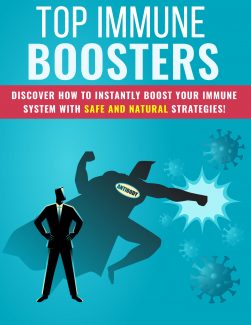 License Type: Private Label Rights
License Type: Private Label Rights  File Type: ZIP
File Type: ZIP
 SKU: 63469
SKU: 63469  Shipping: Online Download
Shipping: Online Download
Sample Content Preview
Introduction
Your immune system is an amazing machine. It’s responsible for keeping your body safe from outside invaders like viruses, bacteria, fungi, and toxins.
There are two main parts of your immune system: the part you were born with (innate or non-specific system) and the part you develop from exposure to the environment (adaptive acquired, or specific system).
Your immune system is made of various organs, cells, and proteins – skin cells, blood, bone marrow, tissues and organs like the thymus and lymph glands.
A strong immune system is your best defense against illness and infection. Without it, you would have no way of fighting off harmful substances or changes within the body.
Your immune system has three main tasks:
To fight pathogens (disease-causing “germs”) like viruses, bacteria, fungi or parasites and get them out of your body
To recognize and neutralize harmful substances from the environment
To fight disease-causing changes in the body, like cancer cells
Your immune system is activated by antigens – things the body doesn’t recognize as belonging there. These are proteins on the surfaces of bacteria, viruses and fungi.
When the immune system cells come into contact with these antigens, a whole series of processes is stimulated in your immune system.
The good news is that once your immune system comes in contact with a germ, it will recognize that germ if it sees it again. This is why vaccines work to protect you against certain diseases.
In this special report, we’ll take a look at the top all-natural and safe immune boosters that everyone can take advantage of to strengthen your immune response, increase your resistance to disease and infection, and help you recover more quickly if you do become ill.
Let’s begin!
Get Plenty of Sleep
Not getting enough sleep can lower your immune response and leave you more likely to succumb to infection.
In a study of 164 adults, the ones who slept less than six hours a night proved more likely to catch a cold than those who slept longer.
When you’re sleep-deprived, your body makes stress hormones like cortisol to keep you awake and alert – and that can suppress your immune system.
And you may also take longer to recover if you’re sleep-deprived. That’s because your body can’t make enough antibodies to fight off disease if you’re not rested.
Your body also releases special proteins (cytokines) that help your immune system – but they only do that while you’re asleep. Your body does a lot of healing and regenerating while you’re asleep.
Typical adults should try to get seven or more hours of sleep daily to function properly.
Teens need eight to ten hours a night and younger children and infants need to get up to 14 hours of sleep to be at their best.
People who got a full eight hours of sleep had higher levels of T-cells than those who slept less, according to a 2019 study. And a 2015 study found that those who get seven hours of sleep are four times less likely to come down with a cold than those who were sleep-deprived.
Most modern people don’t get enough sleep, which is a shame because it’s an easy fix to a common problem.
Some tips to getting a good night’s sleep include limiting your screen time starting two to three hours before your bedtime. The blue light from the TV, computer screen or cellphone has been shown to disrupt your body’s natural sleep cycle (circadian rhythm) so shut them all down.
Another thing to limit is caffeine use. If you’re having a tough time getting to sleep, try skipping caffeine after noon. Even if you think your body is used to it, a little caffeine can go a long way.
You can also try sleeping in a totally dark room that is cooler than the rest of your home, as your body cools down when it’s ready to sleep.
Avoid highly stimulating books or conversations right before bed, too. They get your adrenaline levels up and you’ll have more trouble calming back down.
Go to bed at the same time every night, even on your days off and have a set sleep schedule you follow before getting into bed.
If you’re still having trouble with your sleep, talk to your doctor.
Getting a good night’s sleep is essential to a healthy immune system, as well as many other of your body’s systems. You can’t perform at your best if you’re sleep-deprived.
Stay Active
Prolonged intense exercise has been shown to lower your immune response – however, moderate exercise actually boosts that response. Studies show that even one session of moderate exercise can increase vaccine effectiveness in those with compromised immune systems.
“Working out is a powerful way to boost your immune system,” says Mark Moyad, MD, MPH, Jenkins/Pokempner director of preventative and alternative medicine at the University of Michigan Medical Center.
Exercise circulates your antibodies and white blood cells more rapidly, which helps them detect germs more quickly. “Being active this way also lowers stress hormones, which reduces your chances of getting sick,” Moyad adds.
According to a recent study of over 1,000 people, those who exercised at least five days a week had almost half the risk of coming down with the common cold than the more sedentary folks.
Regular moderate exercise can reduce inflammation, too, and that is known to improve your immune system. Exercise can also help your immune cells to regenerate regularly.
Examples of moderate exercise include 30 to 60 minutes of brisk walking, jogging, swimming, steady bicycling, and light hiking three to five times a week.
Notice that most of these are associated with the outdoors. There’s a good reason for taking your exercise outside.
Sunlight can stimulate your T-cells, special parts of your immune system that help fight off infection. And being outside brings you into contact with phytoncides and other plant products that can boost your immune function. It also boosts Vitamin D levels in your body, which help your immune system further.
You should also be doing strength training exercises twice a week to stay at your healthiest. The CDC (Center for Disease Control and Prevention) recommends two and one-half hours of moderate-intensity exercise every week as well as one hour and fifteen minutes of high-intensity aerobic exercise.
So, you should exercise regularly and get enough sunlight to boost your immune system and increase your overall health.








